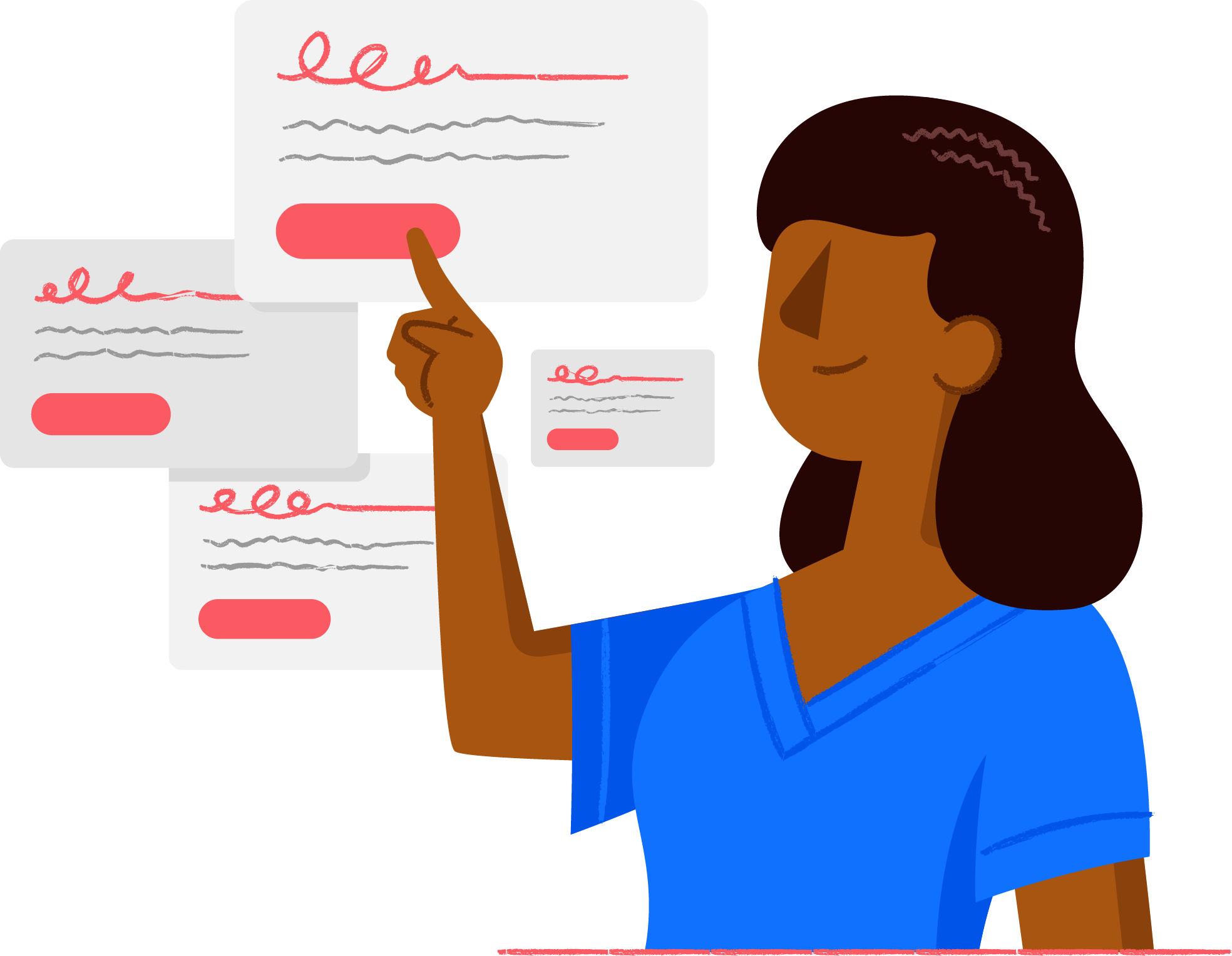- 01 August 2018
- 27 min read
How to qualify for and find job as an occupational therapist
SubscribeWe look at occupational therapy degrees, applying for jobs, writing CVs and cover letters, and thinking about where to take your career next. If you're already qualified, this article can help you with advice about finding employment.

How do I get an occupational therapist job?
To get an occupational therapist job, you need an occupational therapy degree that's accredited by the Health & Care Professionals Council (HCPC) as well as subsequent registration with the HCPC.
The degree will either be a Bachelor's of Science (B.Sc.) and will take at least 3 years to complete or a Master's of Science that takes at least two years.
If any of these details are missing from the courses you're considering, check again.
Assuming it meets these essentials, let's check that you meet the others! Occupational therapy expects quite a lot of you as a student, with UCAS tariffs ranging from 280 to 340 points and anything in Science always a bonus. When we translate this into qualifications, this is an average of BBB at A Level, DDM at BTEC or fifteen level 3 Distinctions in Science/Health and fifteen level 3 Merits in non-Science/Health subjects from your Access course.
In short, you need to be a good student!Evidence of sufficient English and Maths is needed as well. Most courses ask for 5 GCSEs with grades at C or above/5 Scottish Standards at grade 3 or above.
However, regardless of the type of qualification, English and Maths must be included.
Any Science qualifications will look good too.Shop around and get a feel for what's expected.
If you don't quite meet the requirements and you really want to go to a particular university, you can always try contacting the course leader to find out if there's another way of attaining the standard they need.
Courses will sometimes admit prior experience as a way of reaching the UCAS tariff so don't give up and do ask!
I didn't study occupational therapy but I still want to work in the field! This is not a problem!
If you have studied another subject, you can convert to occupational therapy by completing a post-graduate course.
This will take around 2 years of full-time study.On average, courses want you to have a degree that scored a 2:1 or a First in a field that is either Science-based and Health-care based.
Some also allow those with a social/humanities background.
Should you have achieved a 2:2 in your first degree, some universities don't mind but others will want to see further experience in occupational therapy to show your commitment.
Many also want you to demonstrate that you know a bit about the field and have developed some opinions on it.
Work experience will help with this but so will reading around and keeping up to date with industry and policy developments.
A good place to start is a professional journal.
Keep an eye on the news and find articles that relate to occupational therapy. Think around the subject and develop some ideas about how it could affect the discipline.
Keep making notes on the subject and soon you'll have proof of genuine, developed interest to support your application!
Making sure you really want to work as an OTTo be a great healthcare worker requires certain personal qualities; namely, compassion, patience, dedication and commitment.
It's best that you find out if you have these before you spend money on a degree!
Not only are we passionate about encouraging only the best people to work in health care, you'll need some experience for your degree application anyway!
And before you start making firm plans, check with your prospective universities – some will have specific expectations.
But broadly speaking, your best option will be actual work experience in an actual occupational therapy situation.
Fortunately, occupational therapy touches on many areas of healthcare which increases the likelihood that you'll be able to spend some time shadowing and helping out.
The College of Occupational Therapists suggests contacting your local hospital, social services, mental health services or looking at volunteer listings.
With any luck, one of these will be able to help out.
Ask them where they use occupational therapy, ring around to investigate the possibilities and start asking nicely if you can spend some time with the service!
If they can't provide you with proper work experience and instead offer a short tour, go with that – it all counts.
If you've tried this and just couldn't get a placement, don't worry. Other appropriate experience would be with anything that involves strong interpersonal skills.
Perhaps there's a day centre nearby for adults with learning disabilities or a nursery that needs helpers.
If you already have a job in support work, this will go a long way to showing you've the attitude and experience appropriate for occupational therapy. And as before, check with your prospective course leaders – hopefully, they'll be able to be accommodating.

Search Jobs
1000s of jobs for Nurses & Care Professionals. No.1 for UK nursing, care & healthcare jobs.
Search JobsCV basics
When you write a CV, you need to make sure you have your name, home address, telephone number and email address at the top, in a format that's attractive and easy to read.“Yes, yes,” you cry, “I know this!”.
I'm sure you think you do and I'm sure you think your CV has got these covered but, working as a jobs board, you'd be staggered by the amount of people who don't fill out these basic categories.
Upon rewriting my CV recently (and after writing many of these guides), I found my email address wasn't visible in its text box. Worse, I'd converted the .doc file to a PDF, so there wasn't a chance of the employer finding it.
An unbelievably rookie mistake.
First, check your contact details. Your name should be larger than the other details and, if you want, separated from the others and left-justified.
Then, you need your home address, telephone number and email address.
This is an area where a couple of things can let you down: your voice- mail message and your email address.
Both must be simple and functional. Ring yourself and listen to your voice- mail message.
Does it involve any joking or, worse, any in-jokes? If so, ditch it.
Can you actually understand yourself clearly and is it straight-forward? If not, re-record.
Aim for something warm, professional and helpful – anything else won't help your case.
Similarly, your email address... If you don't have one that is essentially just your name, it's probably best you get a new one.
Anything with your first or last name, initials and, if needed, your birth-date or some underscores will look good.
If you want to use your work email, it's up to you, but do make sure you don't send off applications half-way through working your notice and then find yourself unable to retrieve them after you've left!
Ordering your CV
Next, we need to think about how you're going to order your CV.
There are some sections that are essential and some that are debatable. Debatable sections include a personal statement, skills section and a 'hobbies and interests' section.
However, the absolute, base-line essentials to include in a CV are:
Name, address, telephone number and email address
Job history
Education
References
Should you want to add any of the debatable sections, it'll look more like:
Name, address, telephone number and email address
Personal statement
Skills section
Job history
Education
Interests and hobbies
References
As we talked about above, start with your contact details. Make sure they're professional, usable and at the top of the document.
Next, comes the personal statement. That is, if you think you should include it.

What Do You Think?
Ask questions, comment and like this article below! Share your thoughts, add your opinion in the comments below.
CommentDo I need a personal statement? Not sure?
The argument runs thus: one camp says it's a nice, quick way of hooking the reader's interest and covering the basics quickly; the other camp says it's a redundant waste of time.
Unless you're going for a very high-end job with only a few applicants, CVs are looked at ever so quickly by recruiters.
With applicant numbers what they are today, they haven't got time to do a close reading of every nuance (which is why doing what we suggest here is so important!).
The former argument is that personal statements allow you to extract your really important skills and put them right at the top—nice and easy to read.
On the other hand, personal statements are pointless.
Oh, you're a 'hard-working, friendly employee, trained in XYZ, that loves to do their best'?
Great stuff, but so is everyone else.
In fact, that's the bare minimum for being employed. And remember, no-one will ever write the opposite so it's hardly going to make you stand out.
And never forget—stock phrases like these are a sure path to Snoresville.
So, it's your call.
Write a personal statement if you want but only if it's valuable, interesting information and you can keep it short.
And don't use boring, jargon-y phrases.
s with any debatable section, if it takes away space you need for employment, education or skills, don't bother. And don't write in the third person (“Harry is great at....”).
It's just weird.
If you do choose to write a personal statement, here's how to write your personal statement for your next job in healthcare.
Showing off your skills
The idea of a skills section is fairly new in the world of CV writing. Now that we usually hold multiple roles, rather than the old-style 'job for life', this is becoming more useful for condensing job histories.
The best skills you can include are 'hard skills' – these may be discipline-specific (such as, experience with orthotics, derricks or parallel bars) or transferable (like, great with computers or accurate data recording).
'Soft skills', also known as adaptable skills, are less valuable.
It's great that you get on well with others but, as with personal statements, this is really the bare minimum an employer could hope for.
If you think a short-and-sweet, bullet-pointed section will help then include a skills section.
Don't worry if you're newly qualified and only just starting out – your university course, work experience and placements should all give you plenty of things to write about!
 This blog post explains all you need to know about becoming an Occupational Therapist - from qualifications to CVs to interviews, we've got you covered!
This blog post explains all you need to know about becoming an Occupational Therapist - from qualifications to CVs to interviews, we've got you covered!
Become A Community Contributor
Share your story to help and inspire others. Write or create a video about your job or your opinions!
ContributeEmployment and experiences
So, onto your employment history! We write these in reverse chronological format – that is, most recent to least recent. And don't forget to include voluntary work and placements.Seasoned occupational therapists will have to decide what to include and what not to include – newbies might include jobs that others wouldn't.
This allows you to show your employability and reinforce your key transferable skills.
Make sure each job has the name of your employer, start and end dates, your job title and a summary of your responsibilities and achievements.
You need to be really careful about length here. Keep sentences simple, short and around 3-5 sentences.
You can also consider a list of bullet-points an option.
Both look good!
Your education and training
Like the employment section, start with the most recent and work backwards.
If you've been in the field for some time, your most recent entry will be specialised training or post-graduate study.
If you've just graduated, it'll be your degree course. After this comes your further education, be it BTECs, A Levels, Highers or NVQs.
Then come your GCSEs. You don't really need to include these when you get to professional roles like occupational therapy but if it feels right, go ahead.
Should I include my interests and hobbies? This one's always up for debate.
Some say it's a waste of space; others argue it's good for showing that you can strike an appropriate work/life balance.
We would argue that it depends on what you're putting in there and how much you need the space in your CV.
As we all know, we should try to keep our CVs no longer than two sides of A4, where possible. If achieving this and having interests and hobbies means that you sacrifice valuable information about placements, training or work experience, then don't use it.
Similarly, think about what you're writing there. If you have genuinely interesting hobbies that support your career in health care, then adding them could be helpful.
Anything that involves charity, self-development or helping your community will sound great. Hobbies like 'socialising and knitting', not so much.
Making your CV even better – white space, good English and formatting
Once you've written your CV, there are three things you can do to make it even better. Consider how the writing sits on the page; make sure you use good English and format it professionally.
White space
When it comes to transmitting information, there's a certain little something that our brains just love: white space.
This refers to the space around paragraphs and units of information. Like the paragraphs in this article.
As you can see, we've 'chunked' information into short paragraphs and then added a line between each one. This makes your life much easier as you can quickly scan through the article and pick out the bits of information you most need.
Without white space, we have to dedicate more time and effort to reading – not something you want to do if you don't have to!
With white space, recruiters can find out about you quickly. Without it, you risk a CV that makes no effort to look good or read easily.
So trim your paragraphs and give them space to breathe!
Good English
There are a few traps we all risk when writing formal English: writing pretentiously, writing long sentences and writing in the passive voice.
First, don't use long words if you don't need to.
It doesn't make you sound clever and it'll ring hollow as it ain't your natural tone. Use the kind of straightforward language we all use.
Not slang, obviously, but nothing out of the ordinary either.Secondly, take care with your sentence length. If you don't remember to reduce the amount of words in your sentence, people reading it will find it really hard to understand what you're talking about whilst trying to remember all the different parts of the sentence, make sense of it and find the bits they actually want and moreover, they might get bored, which is always a big risk when you're trying to communicate important information.
See what I did there? That sentence has fully 68 words in it.
Make sure you don't do this. Sentences should never be over 25 words.
Exceptions may be academic work but even then, it shouldn't really happen.
If long, run-on sentences are your weakness, read through sentences and look for the 'joining' words.
Words like 'and' or 'but' may signal a place where you could put a full stop. Vary your sentence length too.
It's more fun to read!
Lastly, writing in the passive voice is another classic.
For example: “Efficiency savings of 13% were made by me when I reorganised our booking system”.
This sounds like maybe it should be right for a formal document but CVs (whilst formal) need to communicate information quickly and simply. Make it easy for your reader. Written actively, it reads as: “I reorganised our booking systems and increased efficiency by 13 percent.”.
Much better, don't you think?

Writing your cover letter - why, what, the future and you
Cover letters are a fantastic part of the job application process. They're opportunities to reinforce your brilliance as well as showing the employer a somewhat more personal side.
I didn't know how to write these when I was a whipper-snapper and, by gum, I wish someone had explained them to me.There are four sections to a cover letter:
Why you want the job
What you've been doing that makes you a great candidate
What you hope to achieve in the future
A little bit about you as a worker
Cover letters are formal documents and therefore should be written formally.
You start with 'Dear Sir/Madam,' or 'Dear Mr/Mrs/Ms [name],' and tell them why you are writing to them.
Next, you explain why you're applying. Why this job and not another?
There'll be something that makes this a suitable position so tell them about it. Maybe you want to work with the type of patient they support or perhaps they work with specific illnesses that you find especially compelling. Whatever it is, tell them about it.
For the second paragraph, explain how the job aligns with your study and training. If you're a recent graduate, maybe one of your placements gave you a great deal of experience in a certain area.
If you're more experienced, perhaps this has shown you that you really want to focus in a certain area.
Write about what you did, what you liked about it and how it matches their needs in a worker.
After this, we talk about the future.
Why do you think this job is a good prospect for you? How do you see yourself developing if you get the job? Perhaps you see opportunities for training, managerial experience or a chance to get a grounding in a diverse area. When writing about this, remember to emphasise how it will benefit them and their needs too.
Finally, a chance to show off your soft skills!
The last paragraph of your cover letter lets you get descriptive.
What's your forte? Are you great at organising? Fantastic at putting people at ease? Marvellous at team interaction and taking a lead?
Don't go overboard but don't be afraid to let your strengths shine. Done well, this should help get you to interview!
I got the interview!
Of course you got the interview! But what now? Like any profession, there are basic things to prepare for when going to an interview. There are a few specific things that occupational therapists need to think about too and we cover both below!
Basic interview preparation
Preparing for interviews can take as much or as little time as you fancy. We recommend you put the maximum amount of effort in so that you get the maximum out!
Prospective interviewees need to think about:
Travel
Grooming
Learning about the organisation
Preparing your answers
Role-play
Getting to your interview
Whether you know the route well or not, double-check it!
Have a look on the map, get an estimate of how long it will take and then add on 15% to make absolutely sure that you're in time.
If you've got the time and commitment, a practice trip could save you a lot of grief on the day.
Another useful tip is to check public transpose websites and your local council site. The latter can tell you if there are road-works or public demonstrations that will affect traffic; the former of maintenance work, delays and strikes.
If you don't use public transport, check out those niggling issues on your car or bike so that interview day ain't the day they finally clap out!
And, fill up your tank the night before!
Looking good
Everyone knows to lay their outfit out the night before but don't forget about all the other stuff too!
A week beforehand (where possible), you need to think about dry-cleaning, getting a hair-cut and any mending jobs needed on your posh frocks.
Similarly, if you have any grooming rituals more complicated than washing your hair or having a shave, get them done a few days beforehand too. Just in case something goes horribly wrong and you need time to repair it!
Finding out about the company
If you don't do your homework on the company, you will look and feel like a fool when they ask.
That's personal experience speaking. It wasn't a professional position but I still should have known something about them.
Visit their website and read up on the organisation
What's their mission statement and why do they do what they do? Why did they start? Has there been any controversy and how did they react? Another great resource are inspection reports.
A good place to start is the Care Quality Commission (CQC) so go to their website, search for the place and read up!
Find out how they responded to inspections and, if there was anything out of the ordinary, have an opinion on it and thoughts about what you would have done in their shoes.
What am I going to say?
Working out what you're going to say is so worth it. I don't mean that you should write a script but that you should know what kinds of things you will talk about when asked certain questions. So, for instance, every interviewer asks questions like 'Tell me about a time when XYZ happened; what did you do?”. You need to think of a scenario and have some positive, professional answers.
Try the STAR method. Take your Situation, identify what your Task was, remember what Action you took and the Result after.
So, for instance, your Situation may be that of having had your patience tested. Your Task was to stay professional and helpful, even under pressure. You took appropriate Action and hopefully, the Result was positive with everyone staying stress-free!
Interviewers will ask all kinds of different things so think about what you'll say when asked about yourself, your course, your placements, your personal reflection and the multitude of scenarios relevant to occupational therapy.
Role-play: practice makes perfect
Some folks find role-play contrived and irritating. You know what's worse?
Being in an interview, stuttering and mumbling because you didn't practice!
Get a mate, sit down and get them to put on their sternest interviewer face.
Your goal here is to practice accessing the relevant information they want without looking like a rabbit caught in the headlights.
People normally let themselves down most by fiddling, mumbling, saying 'ummm' too much, not making eye contact, whingeing about colleagues and saying things in a negative way.
And the worst thing is, we don't always notice these things ourselves!
So get your best bud to watch you like a hawk as you respond and, together, you can make sure you're on top form for the real thing.
Occupational therapy interviews
As mentioned above, the sections before are needed for any interview.
For occupational therapist job interviews, you will encounter industry-specific questions, designed to test your full and holistic understanding of the role.
Specifically:
The role itself
Things that could happen
The profession
How you develop yourself as a worker
Giving a presentation
Your professional portfolio
Understanding of the role
This question will be key in checking that you are truly suitable for the role.
Read back through the job specification again and identify the bits that seem most important.
Practice summarising them in 2 – 4 simple but informative sentences so that the employer can see that you properly understand what you're interviewing for!
Scenarios and conditions
As with any people-centred/healthcare job, there will be plenty of unusual and challenging situations. You'll probably be asked about scenarios that test service users' access to services, risk management, your patience and your ethics.
If you have a look online, there are lots of places with sample questions. For example, you may be asked to talk about a time that involved confidentiality, patient choice, self-destructive behaviours or missing equipment.
Again, it may help to use the STAR method, albeit in a hypothetical manner.
Think of the best Result for the Situation and work backwards through the Task and Action.
Understanding the profession
For this, you need to be able to tell them about what an occupational therapist actually does.
This shouldn't be too hard, given that you've completed a degree in the subject and likely had an amount of experience in the field itself.
You don't need too much preparation but find a way of summarising the role without rambling or missing out the important bits. A few well-prepared sentences should do the trick
Personal development and professional portfolio
When you enter a professional world, you need to show that you are ever-learning.
Technology and cultural expectations develop and mature quickly these days and professionals need to show that they can keep up. Unless you are at the very, very beginning of your career, you should be reading journals and, hopefully, you have the time to attend courses or take on further study! Make a list so you can tell the interviewer about them. These may be things you want to include on your CV as well. Similarly, a professional portfolio can be very helpful.
They may not ask to see it but having one ready will cover the bases. This should contain a job history, professional reflections, development goals, samples of development-related documents and evidence of personal successes. Some may choose to use sections that relate to specific skills. Whatever you choose, make sure it's in a nice folder and well-presented.
Presentations
Finally, be aware that you may be asked to give a presentation. It doesn't always happen but it may. As with preparing for your interview performance, a practice presentation with a trusted person will be good for getting rid of those pesky performance errors!
Typical career paths
Once you've gotten your job, you can think about where you want to go with it! The nice thing about occupational therapy is that the main skills involved transfer very well to different sectors of the industry, whether you're working with burns sufferers, in stroke rehabilitation, oncology or OCD sufferers.
Whatever your prior experience, you should (theoretically) be able to adapt and move to working with different types of service users, whatever their needs.
You'll start in a occupational therapist job.
This could be with the NHS, a private healthcare provider, with the armed forces, with your local council, with community providers or in industry. Occupational therapists can work independently and as consultants but this is better left until after you've gotten some broader experience in the discipline with other more experienced practitioners.
After some time in the field, you can become a practice placement educator that looks after OT students.
If you do have the opportunity to take on this role, we'd recommend it – teaching is a fantastic way to learn more about a subject and your performance within it.
As the years progress, you'll have the option to move into management and leadership; into education and teaching of the newbie therapists; take on a research degree to develop methodologies and technology, or set up on your own. If you choose the latter, you'll need to have some business sense in order to attract and retain clients.
Off and away!
And finally, we've reached the end of our guide! We hope that this has been helpful, whether you're a student starting out or a seasoned therapist thinking about applying for that next rung on the career ladder.
Best of luck!






About this contributor
Nurses.co.uk Founder
I believe people working in healthcare should be able to choose to enjoy work. That is, choose an employer who reflects their values and provides them with a sustainable career. This leads to better patient care, higher retention rates and happier working lives in this most important employment sector.
More by this contributorWant to get involved in the discussion?
Log In Subscribe to comment